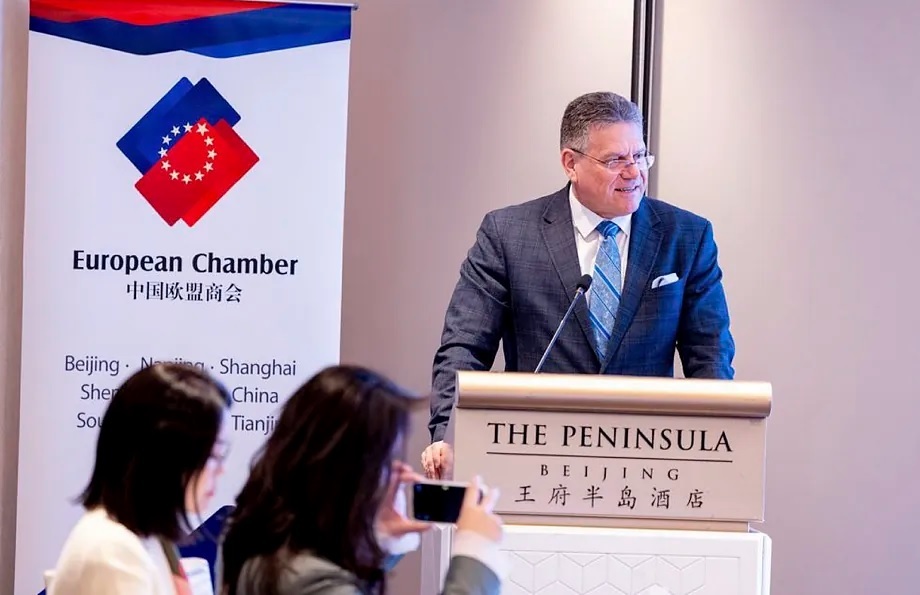"China considers Europe a very important part in a multipolar world and supports it in maintaining its strategic autonomy." This was the message that Chinese Foreign Minister Wang Yi conveyed earlier this week to Portuguese Foreign Minister Paolo Rangel, who was visiting Beijing. Wang also extended the same gesture to the EU when he met with his French counterpart, Jean-Noel Barrot, who arrived in China almost at the same time as the EU Commissioner for Trade, Slovak Maros Sefcovic. This week, the President of the Italian Senate, Ignazio La Russa, also visited Beijing. "After months of being used as a political punching bag by Trump, the southern European capitals are seeking alternatives," stated the Italian.
These alternatives seem to involve the second world power. The European delegation's visit to China this week is serving to assess the promise of the Xi Jinping government, which is actively engaging with traditional US allies in a bid for greater openness towards European companies. This is particularly relevant following numerous complaints from EU countries about the lack of reciprocity and barriers faced by companies in the Chinese market.
"China is willing to work with the European Union to resist protectionism," said Vice Premier He Lifeng, the official leading negotiations in the new trade war with Trump, during his meeting with Commissioner Sefcovic. The country's economic czar extended a hand to the EU's trade chief to join forces in addressing the threats of Trump's trade tariffs.
"We need to tangibly rebalance our trade and investment relationships," noted Sefcovic in a post on X. Before traveling to China, he was in Washington trying to convince his American counterparts that the tariff war benefits no one and to extend Brussels' offers to reduce tariffs on US imports and buy more products. Just as the Commissioner landed in Beijing, Trump once again shook the markets by announcing tariffs of 25% on cars not made in the US.
Sefcovic has been trying to maintain a tough stance towards Beijing, which is using all its propaganda channels to sell in Brussels that now is the opportune moment to come together because they share a common adversary, as demonstrated after Trump unleashed his tariffs and disrupted the American umbrella covering European security architecture. This message is resonating in many European countries. "We need a stronger relationship between France and China more than ever," stated French Minister Jean-Noël Barrot during his visit to Beijing on Thursday.
"The EU should safeguard its interests and make the rational choice to get closer to China, given the uncertainty generated by the new administration in the United States. As uncertainty about US policy increases, China, as a major world power, becomes increasingly important for its stability and reliability," stated a recent editorial in the Chinese state tabloid Global Times.
Following the European leaders' visit to Beijing this week, the next prominent visit is that of Spanish President Pedro Sánchez, who will meet with Xi Jinping on April 8. "The change we are seeing regarding China comes from the European Commission, as evidenced by the moderation in the discourse of its President, Ursula von der Leyen, and from Spain, which has strongly pressed, with the help of Italy, to engage more with China," notes analyst Sari Arho Havren from the London-based think tank Royal United Services Institute (RUSI). Havren also asserts that EU countries geographically further from Russia and Ukraine are showing more openness towards China compared to those states more directly influenced by the conflict.
While key figures in Brussels, such as von der Leyen or EU Foreign Affairs Chief Kaja Kallas, maintain a tough stance towards the Chinese regime, many leaders are opting for closer ties with Beijing. With the trade war unleashed by Trump taking shape, hitting both China and the EU, the Asian superpower insists on presenting itself as a reliable partner rather than an adversary (or a systemic rival, as the official stance indicates), aware that the transatlantic alliance is faltering.
In early March, in a further sign of thawing, the European Parliament lifted a series of restrictions in place since 2023 on meetings between MEPs and some Chinese officials. Hours later, Chinese Foreign Minister Wang Yi, in a conciliatory tone, elaborated in a press conference on the need for Beijing and Brussels to improve their relations and work together.
The EU significantly hardened its stance towards China during the long pandemic closures. When the Asian giant reopened its doors, many European leaders opted to resume dialogue with the Xi Jinping government and began to visit Beijing regularly, aware that a trip to China is always productive in terms of returning home with beneficial trade agreements in hand.
Apart from each European country's individual ties, relations between the bloc and Beijing soured again after Brussels approved tariffs on Chinese electric cars. Now, following the geopolitical chaos caused by Trump's return, both sides are drawing closer.
